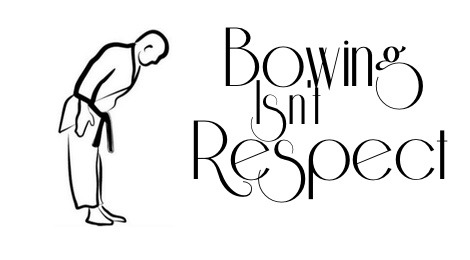The mere act of bowing isn't a show of respect for your instructor if your other behaviours are not equally respectful. Although my classes are fairly informal, that doesn't mean that respect does not exist.
A Low Threshold
In my Bartitsu classes (as well as my stage combat classes), we do not have many explicit rules of conduct. We have a set starting time at which time we perform Academie Duello's salute together. We have explicit rules on our safety waiver, suggesting that obeying the instructor is for the good of all students. Other than that, the rules of conduct are implicit.
I personally think that the imposition of arbitrary rituals such as bowing when entering a training space or addressing the instructor by an honorific title are not good lessons. Respect for all others as equally deserving, and respect for the learning process by listening to instruction and trying to perform as well as possible does not also entail bowing the head to a hierarchy.
One of the reasons I do not teach children's classes is because I choose not to spend class time on discipline or rituals. Youth classes understandably require the teacher to explicitly state the rules and to enforce them with penalties, such as push-ups, standing aside and maintaining a difficult stance, or cleaning up after class. I prefer to work with adults because I assume that the etiquette of a training session is understood and punishments would not be necessary.
But sometimes my assumptions are wrong. So for those who will be taking my classes or any other instructor's lessons, here are some rules that you will generally be expected to follow, even if they are unstated.
The (Implicit) Rules
The following examples show disrespect for the class they're taking and the instructor teaching it, and usually also their fellow students:
- Making excuses for not performing a movement as taught
- Arriving late
- Doing an exercise with minimal energy and focus, or getting through it as quickly as possible so that they can take a break or socialize
- Paying so little attention while the instructor is explaining an exercise, drill, or activity that they need the instructor to repeat themselves immediately upon starting the activity.
- Using class time for showing off their flexibility, strength, endurance instead of learning, or improving themselves
- Arguing with the instructor about history, physics, anatomy, language, or any other aspect of the lesson (questions are usually fine, and clarifications are encouraged).
- Correcting your training partner (there's only one instructor in the room, but you can offer advice)
Familiarity
Being familiar with the type of class you'll be taking will make you more aware of the implicit rules there. A martial arts class is different from a dance class.
Too much familiarity with a particular instructor can lead to a bad example for other students. You may have a meal with your coach outside of class or ask their advice on a personal matter because you trust their judgement. However, in class it is important that everyone is treated equally. So, no matter your level of familiarity with your teacher, make other students feel that they are included by acting like any other student. Your knowledge of the implicit rules can make you a shining example to other students. You are doing your instructor a huge favour by making the classroom a place of equal learning.
